
Mel Columcille Gerard Gibson is an American actor and film director. He is known for his action hero roles, particularly his breakout role as Max Rockatansky in the first three films of the post-apocalyptic action series Mad Max and as Martin Riggs in the buddy cop action-comedy film series Lethal Weapon.

Milton William "Bill" Cooper was an American conspiracy theorist, radio broadcaster, and author known for his 1991 book Behold a Pale Horse, in which he warned of multiple global conspiracies, some involving extraterrestrial life. Cooper also described HIV/AIDS as a man-made disease used to target blacks, Hispanics, and homosexuals, and that a cure was made before it was implemented. He has been described as a "militia theoretician". Cooper was killed in 2001 by sheriff's deputies after he shot at them during an attempted arrest.

Enemy of the State is a 1998 American political action thriller film directed by Tony Scott, written by David Marconi, produced by Jerry Bruckheimer, and starring Will Smith and Gene Hackman with an ensemble supporting cast consisting of Jon Voight, Lisa Bonet, Gabriel Byrne, Dan Butler, Loren Dean, Jack Black, Jake Busey, Barry Pepper, Scott Caan, Jason Lee, Tom Sizemore, Seth Green, and Regina King. The film tells the story of a group of corrupt National Security Agency (NSA) agents conspiring to kill a congressman and the cover-up that ensues after a tape of the murder ends up in the possession of an unsuspecting lawyer.

Air America is a 1990 American action comedy film directed by Roger Spottiswoode and starring Mel Gibson and Robert Downey Jr. as Air America pilots flying missions in Laos during the Vietnam War. When the protagonists discover their aircraft is being used by government agents to smuggle heroin, they must avoid being framed as the drug-smugglers.

Ransom is a 1996 American action thriller film directed by Ron Howard from a screenplay by Richard Price and Alexander Ignon. The film stars Mel Gibson, Rene Russo, Gary Sinise, Delroy Lindo, Lili Taylor, Brawley Nolte, Liev Schreiber, Donnie Wahlberg and Evan Handler. Gibson was nominated for a Golden Globe Award for Best Actor. The film was the 5th highest-grossing film of 1996 in the United States. The original story came from a 1954 episode of The United States Steel Hour titled "Fearful Decision". In 1956, it was adapted by Cyril Hume and Richard Maibaum into the feature film, Ransom!, starring Glenn Ford, Donna Reed, and Leslie Nielsen.

Payback is a 1999 American neo-noir action thriller film written and directed by Brian Helgeland in his directorial debut, and starring Mel Gibson, Gregg Henry, Maria Bello, and David Paymer. It is based on the novel The Hunter by Donald E. Westlake using the pseudonym Richard Stark, which had earlier been adapted into the 1967 film noir classic Point Blank, directed by John Boorman and starring Lee Marvin.
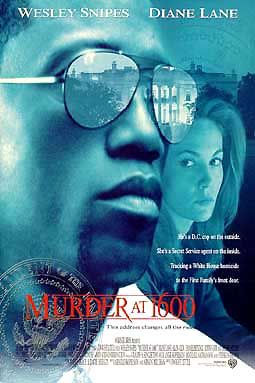
Murder at 1600 is a 1997 American action thriller film directed by Dwight Little and starring Wesley Snipes and Diane Lane.
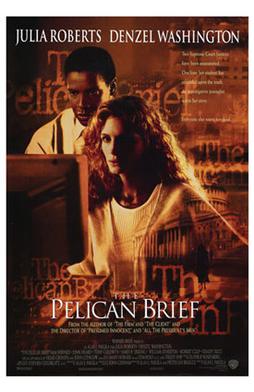
The Pelican Brief is a 1993 American legal thriller film based on the 1992 novel by John Grisham. Directed by Alan J. Pakula, the film stars Julia Roberts in the role of young law student Darby Shaw and Denzel Washington as Washington Herald reporter Gray Grantham. The film, which features music composed by James Horner, was the last film that featured Pakula as both writer and director before his death.

The black helicopter is a symbol of an alleged conspiratorial military takeover of the United States in the American militia movement, and has also been associated with UFOs, especially in the UK, men in black, and similar conspiracy theories.

The 4th Floor is a 1999 mystery horror thriller film, written and directed by Josh Klausner in his directorial debut and starring Juliette Lewis, William Hurt, Shelley Duvall and Austin Pendleton. The film was released in 1999 on Fantasy Filmfest in Germany, but was not released in the US until 2000 when it went direct-to-video. It was filmed on location in New York City and Saint John, New Brunswick, Canada. The original music was written by Brian Tyler.

Edge of Darkness is a 2010 conspiracy action thriller film directed by Martin Campbell, written by William Monahan and Andrew Bovell, and starring Mel Gibson and Ray Winstone. A British-American co-production, it is based on the 1985 BBC television series of the same name, which was likewise directed by Campbell. This was Gibson's first screen lead since Signs (2002), and follows a detective investigating the murder of his activist daughter, while uncovering political conspiracies and cover-ups in the process. It was released on 29 January 2010. It received mixed reviews from critics, though Gibson's and Winstone's performances were praised, and grossed $81 million against its $80 million production budget which made it a box-office bomb.
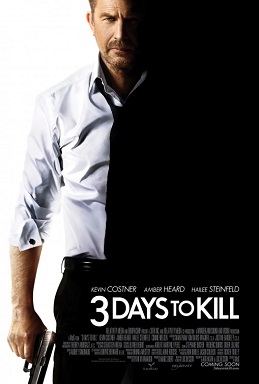
3 Days to Kill is a 2014 action thriller film directed by McG and written by Luc Besson and Adi Hasak. It stars Kevin Costner, Amber Heard, Hailee Steinfeld, Connie Nielsen, Richard Sammel, and Eriq Ebouaney. It was released on 21 February 2014, received mixed reviews, and grossed $52.6 million against its $28 million budget.

The November Man is a 2014 spy action thriller film based on the novel There Are No Spies by Bill Granger, which is the seventh installment in The November Man novel series, published in 1987. A British-American production, it stars Pierce Brosnan, Luke Bracey and Olga Kurylenko, with Bill Smitrovich and Will Patton also appearing, with the screenplay written by Michael Finch and Karl Gajdusek. The film is directed by Roger Donaldson, who previously worked with Brosnan on Dante's Peak. The film was released on August 27, 2014 in the United States.

Unlocked is a 2017 action thriller film directed by Michael Apted, written by Peter O'Brien, and starring Noomi Rapace, Orlando Bloom, Michael Douglas, John Malkovich and Toni Collette. It was Apted's final film before his death in 2021. It was released in the United Kingdom on May 5, 2017, by Lionsgate.
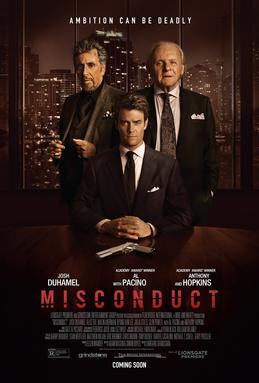
Misconduct is a 2016 American thriller film directed by Shintaro Shimosawa in his directorial debut and written by Simon Boyes and Adam Mason. The film stars Josh Duhamel, Alice Eve, Malin Åkerman, Byung-hun Lee, Julia Stiles, Glen Powell, with Al Pacino and Anthony Hopkins. The film was released in a limited release and through video on demand on February 5, 2016, by Lionsgate Premiere.

Mile 22 is a 2018 American espionage action thriller film directed by Peter Berg and written by Lea Carpenter, from a story by Carpenter and Graham Roland. The film stars Mark Wahlberg, Iko Uwais, John Malkovich, Lauren Cohan, and Ronda Rousey. It follows an elite top secret CIA unit composed of paramilitary officers from the Special Activities Division's Ground Branch, that has to escort a high-priority asset, a rogue police officer, 22 miles to an extraction point while being hunted by the government. The film marks the fourth collaboration between Berg and Wahlberg, following Lone Survivor, Deepwater Horizon, and Patriots Day.
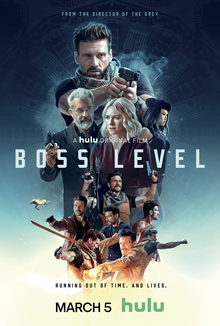
Boss Level is a 2020 American science fiction action film directed by Joe Carnahan and written by Carnahan and Chris and Eddie Borey, from a story by the Boreys. It stars Frank Grillo as a retired special forces soldier who tries to escape a never-ending time loop that results in his death. Mel Gibson, Naomi Watts and Michelle Yeoh co-star.

Last Looks is a 2022 American-British mystery film, directed by Tim Kirkby, from a screenplay by Howard Michael Gould based on his novel of the same name. It stars Charlie Hunnam, Mel Gibson, Morena Baccarin, Lucy Fry, Rupert Friend, Dominic Monaghan, Jacob Scipio and Clancy Brown.

Dangerous is a 2021 action thriller film directed by David Hackl and starring Scott Eastwood, Tyrese Gibson, Famke Janssen, Kevin Durand, and Mel Gibson. The film was released on November 5, 2021. It was David Hackl's fifth film as director. Dangerous was produced by Kevin DeWalt, Ben DeWalt and Doug Falconer under the banners of Mind's Eye Entertainment and Falconer Pictures; and marks the last film of Falconer as a producer - he suddenly died in July 2021 before the release of the film. The film was distributed in the United States and the United Kingdom by Lionsgate. It received negative reviews from critics for its plot and action.

Agent Game is a 2022 American spy action-thriller film directed by Grant S. Johnson and written by Mike Langer and producer Tyler W. Konney. It stars Dermot Mulroney, Adan Canto, Katie Cassidy, Annie Ilonzeh, Rhys Coiro, Barkhad Abdi, Jason Isaacs, and Mel Gibson. Filming took place in Augusta, Georgia, from March to April 2021.




















